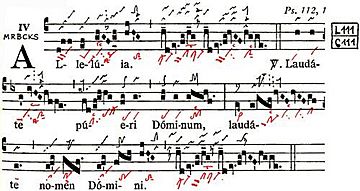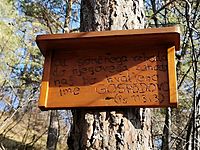Psalm 113 facts for kids
Quick facts for kids Psalm 113 |
|
|---|---|
| "Praise ye the Lord, O ye servants of the Lord" | |

Beginning of the "Hallelujah"
in the Graduale Triplex, 1979 |
|
| Other name |
|
| Language | Hebrew (original) |
Psalm 113 is the 113th song or poem in the Book of Psalms. This book is part of the Hebrew Bible and the Christian Old Testament. In Latin, this psalm is known as Laudate pueri Dominum.
Sometimes, you might see this psalm called Psalm 112. This is because different versions of the Bible, like the Greek Septuagint and the Latin Vulgate, use a slightly different way of numbering the psalms.
Psalm 113 is an important part of worship for many religions. It is used in Jewish, Catholic, Lutheran, Anglican, and other Christian services. In Judaism, it is the first of six psalms that make up the Hallel. The Hallel is a special prayer of praise and thanks. It is said on Rosh Chodesh (the first day of a Hebrew month) and on Jewish holidays.
In the Catholic Church, Psalm 113 is one of the psalms used during the vespers service. Many famous composers have set this psalm to music. One well-known example is by Claudio Monteverdi in his Vespro della Beata Vergine from 1610.
Contents
What Psalm 113 Says
This psalm is all about praising God. It tells everyone to praise God's name. It says that God's name should be praised everywhere, from where the sun rises to where it sets.
The psalm also talks about how great God is. It says God is high above all nations and that His glory is above the heavens. Even though God is so powerful, the psalm says He cares for everyone. He helps the poor and needy. He can even help a woman who cannot have children become a joyful mother.
King James Version Text
Here is the text of Psalm 113 from the King James Version of the Bible:
- Praise ye the LORD. Praise, O ye servants of the LORD, praise the name of the LORD.
- Blessed be the name of the LORD from this time forth and for evermore.
- From the rising of the sun unto the going down of the same the LORD's name is to be praised.
- The LORD is high above all nations, and his glory above the heavens.
- Who is like unto the LORD our God, who dwelleth on high,
- Who humbleth himself to behold the things that are in heaven, and in the earth!
- He raiseth up the poor out of the dust, and lifteth the needy out of the dunghill;
- That he may set him with princes, even with the princes of his people.
- He maketh the barren woman to keep house, and to be a joyful mother of children. Praise ye the LORD.
Meaning of Verse 1
The first verse of the psalm says:
- Praise the Lord! or Hallelujah
- Praise, O servants of the Lord,
- Praise the name of the Lord!
In some older versions, like the Douay-Rheims 1899 American Edition, it says "Praise the Lord, ye children." This comes from the Latin word pueri, which means "boys" or "children." Some people believe this verse especially calls on religious leaders, like the Levites, to praise God. But it is also a general call for everyone to praise God.
How Psalm 113 is Used
In Judaism
The word "Hallel" means "praise" in Hebrew. Psalm 113 is the first of six psalms (Psalms 113–118) that form the Hallel. When the Hallel is recited, Psalm 113 is always said completely.
These psalms are sometimes called the "Egyptian Hallel." This is because Psalm 114, which is part of this group, talks about the Jewish people leaving Egypt. All these psalms are believed to be inspired writings by King David.
Some verses from Psalm 113 are used in other Jewish prayers:
- Verse 2 is part of the Baruch Hashem L'Olam prayer, which is said during Maariv (evening prayers).
- Verse 2 is also part of the mezuman prayer before Birkat Hamazon (Grace After Meals).
- Verse 2 is recited when opening the Hakafot on Simchat Torah.
- Verses 2–4 are part of the Yehi Kivod prayer in Pesukei Dezimra (verses of praise).
In Music
Because Psalm 113 is part of the vespers service, many composers have created musical versions of it. They often set the Latin text, Laudate pueri Dominum.
- Claudio Monteverdi included a setting in his Vespro della Beata Vergine in 1610.
- Mozart set the text in two of his vespers compositions: Vesperae solennes de Dominica (K. 321) and Vesperae solennes de confessore (K. 339).
- Other composers who set this psalm to music include Marc-Antoine Charpentier, Antonio Vivaldi, and George Frideric Handel.
- Jan Dismas Zelenka wrote two settings for a single singer, trumpet, and orchestra.
- In 1830, Mendelssohn set the psalm as one of his three Motets for female choir and organ.
- In 1863, Bruckner created a German setting of the psalm, called Psalm 112 Alleluja! Lobet den Herrn, ihr Diener.
See also
 In Spanish: Salmo 113 para niños
In Spanish: Salmo 113 para niños


